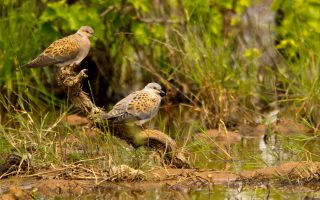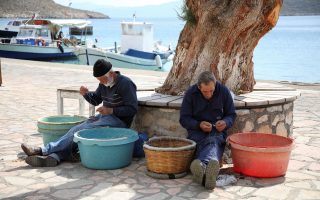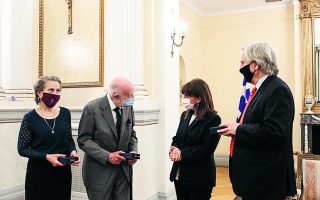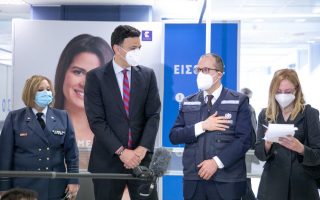Young trailblazing Greeks
Three scientists who were included in the Forbes Europe 30 Under 30 list talk to Kathimerini
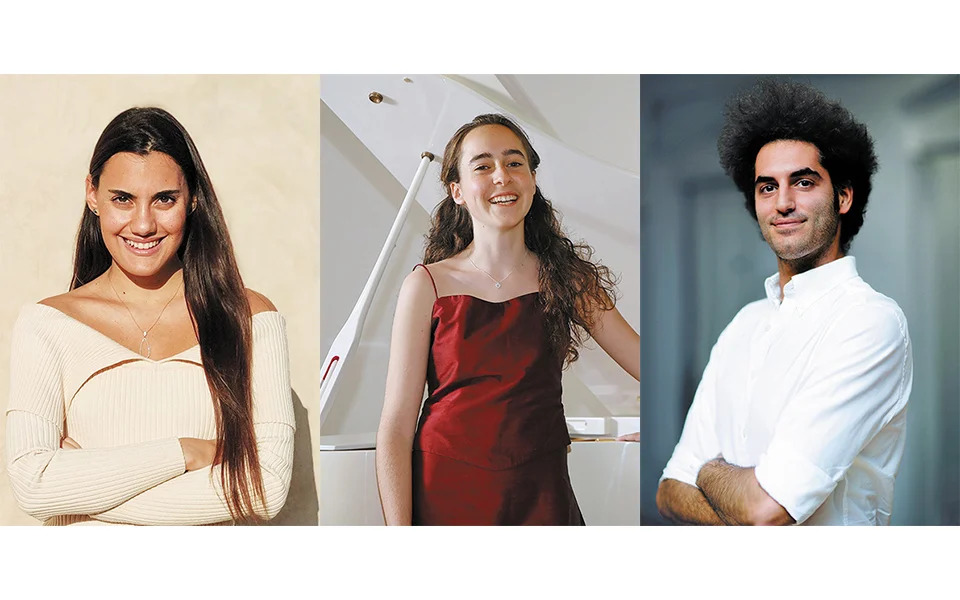
Over the last decade, Forbes magazine has published a popular list that highlights 30 people under the age of 30 who are successful in a variety of sectors, including technology, the arts and culture. Six years ago, Forbes began publishing a European version of the list, which this year features over 300 young people who stand out in their fields, with four Greeks among them this year. Three of the four, who were honored in the Science and Health category, talk to Kathimerini about their journey, their plans, and Greece.
Yannis Assael, who is 29, grew up in Thessaloniki. In 2008, he graduated from Anatolia College and went on to study applied computer science at the University of Macedonia. For his first graduate degree, he was awarded a scholarship from the Government Scholarship Foundation to study at the University of Oxford, where he was distinguished for earning the best grade in his year. He continued his education with a master’s from Imperial College London. In 2016 he returned to Oxford to work on his PhD in artificial intelligence, which he completed in 2019, while simultaneously working at DeepMind, Google’s subsidiary dedicated to AI.
“I try to work with issues that have yet to be solved,” he tells Kathimerini, stressing that he wants his work to have a positive social impact. One of his projects during his time at Oxford concerned a model of lip reading and audiovisual voice recognition, and how it could be applied to tracheotomy patients. He now works with AI and its application in cultural projects, such as restoring damaged ancient Greek texts. Everything began with a friendship that started at Oxford; a historian friend of Assael was discussing the difficulties faced by those studying inscriptions, including the problem of restoring destroyed texts.
Gradually an idea was born, and Assael built a machine learning platform from scratch, the artificial intelligence part of a mathematical model of neural networks inspired by human neural networks, which can learn to make correlations and discover new ones by accessing a vast database of information. In this case, the AI comes up with a variety of possible versions, each with its own probability percentage, that could fill the gaps in partially destroyed texts, potentially restoring parts of inscriptions long lost to history.
“It is impossible for a human to memorize over 200,000 inscriptions at the same time and to conduct searches in the same way a model can. This is why I believe that there are many beautiful things we can do, creatively, to advance the digital study of the arts and humanities,” he says, adding that the possibilities created by the cooperation of the human factor with artificial intelligence applications are inconceivable.
“There are sectors that still have not been affected by artificial intelligence; the revolution my generation will witness is incredible,” he remarks. He describes the feelings he experienced when he saw his name published in the Forbes list earlier this month as “a great honor, and pride as a Greek.” Despite being based abroad for many years, specifically in the UK, Assael feels it is his obligation to give something back to his country, such as the transfer of knowledge, for example through university lectures.
Would he want to return to Greece permanently? “Under the right circumstances, every Greek living abroad would want to return. We should work toward creating these conditions, because the moment is not here right now,” Assael states, pointing to many examples of outstanding Greek academics based both in Greece and abroad. However, he believes that conditions at Greek universities can still be improved and notes that only in the last two years have research institutes begun expanding in Greece.
“I think what drives artificial intelligence research is the cooperation of universities and private research institutes; one has the expertise and the other the funds,” he says.
Music and medicine
Marianna Kapsetaki, who was 30 on April 14, is pursuing an innovative idea, focusing her research on spatial memory in stroke patients, inspired by her experience as a concert pianist. These two fields, music and medicine, define her life. She grew up in Kokkini Hani, a coastal settlement on Crete, and attended the Iraklio Music School where, among other instruments, she was taught to play piano and guitar while excelling in other fields of study such as math. Upon graduating, she was accepted to study in London.
“It was a big difference from my little village on Crete. My parents were afraid of letting me go there by myself,” Kapsetaki, who is half-British, tells Kathimerini. She decided to study medicine on Crete, while twice a month she and her twin sister, who studied biology, would take the ferry to Athens for private piano lessons with a former Juilliard teacher. She had received her piano diploma when she was 17, but was never interested in teaching it; “I wanted to play piano,” she says. In the meantime, she graduated from medical school, and began looking for graduate degrees abroad. She was given a way to combine art and science, her two great loves, in London.
The title of the graduate degree Kapsetaki chose to study at University College London was “Medicine of the Performing Arts.”
“You learn of all the medical problems faced by those involved in the performing arts,” she says.
During her graduate degree at UCL, Kapsetaki took piano lessons with a teacher from the Royal Academy of Music. The graduate degree examined eating disorders among musicians – after collecting data from 300 musicians, she wrote of a probable correlation between the musicians’ increased stress levels and an increased tendency toward eating disorders.
The zenith of her research was reached during her PhD in cognitive neuroscience at Imperial College London, where she was funded by a scholarship.
“I have always liked memory,” remarks Kapsetaki. “During concerts I’m asked, ‘How can you remember so much, all these notes, all these rhythms?’ and I always wondered how the brain can remember so much,” she says.
For her PhD research, she conducted one of the largest studies on stroke patients’ spatial memory ever. “Studying these patients (112 stroke patients at Charing Cross Hospital), you can understand which area of the brain is important to memory and specifically spatial memory,” she states.
The idea that came to her while she was playing the piano was to not just study spatial memory, but also chronological order. She was preparing some piano pieces by Beethoven and Chopin, among others, for an international competition, and thought that if there was no chronological order, if we could not remember which note followed which, music would have no purpose.
“It is like one inspires the other,” she says of music and medicine. “When I want an idea, I play the piano.” She is now considering her next steps, especially with her specialty – she wants to focus on how the brain functions – and if she will return to Greece, where she worries research is not supported as fervently as abroad.
Twenty-eight-year-old Constantina Theofanopoulou grew up in Athens and went to school at the Arsakeio in Ekali and Psychico. What interested her was how people speak to each other and how the way in which we communicate can be compared to communication in the animal kingdom, but her journey to research this question led her along a different path. She studied Greek, focusing on linguistics, but soon realized that she would have to focus her studies on the brain. To this end, she moved to Barcelona and completed a graduate degree focusing on the neuroscience of language.
Later, during her PhD, she began an intercollegiate study – that also took her to the Rockefeller University in New York – on the mechanisms of the oxytocin hormone used in human language and the vocal communication of birds.
“To understand the role of a gene in a system like language, we have to deeply understand its evolution,” she notes. To examine the quality of oxytocin in depth, she began a thorough study of genomes, realizing that scientists often use different names for the same genomes. She now wants to create a unified codification for all vertebrate genomes.
That was how she came to approach the European Reference Genome Atlas (ERGA) project, whose goal is the correlation of all European biodiversity genomes, and together with a colleague she represents the Greek team participating in ERGA, whose priority is the correlation of all genomes in Greek species facing extinction.
“My participation in ERGA’s Greek team gives me great hope for the future, and I think that at some point I will be able to come back,” states Theofanopoulou. But, similarly to Assael and Kapsetaki, she worries that the funds for scientific research in Greece are very limited in comparison to America or other European countries.
She approaches the neurobiology of language through lab work at the Rockefeller University, trying to define the neural circuits that sustain the vocal production of humans and other animals, especially birds. Her inclusion in the Forbes list gave her both peace and joy, which she can share with her loved ones.
“It reflects that the journey that brought me to this distinction was not a lonely one,” she says.
